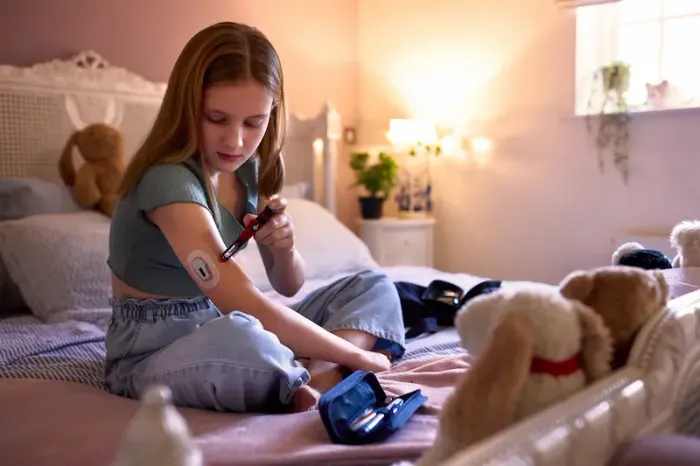Strategies for Managing Childhood Diabetes
Know all about childhood diabetes, types of diabetes, common symptoms, and strategies for managing childhood diabetes.


Introduction
Managing childhood diabetes can feel overwhelming, but with the right strategies, you can help your child live a healthy and happy life. Diabetes in children, especially Type 1 diabetes, requires daily attention, but with proper care, children can thrive just like their peers.
This guide will walk you through practical ways to manage childhood diabetes, from monitoring blood sugar levels to making smart food choices and staying active.
Understanding Childhood Diabetes
Childhood diabetes is mainly of two types:
1. Type 1 Diabetes – The body doesn’t produce insulin (a hormone that regulates blood sugar). This type is more common in children and requires lifelong insulin therapy.
2. Type 2 Diabetes – The body doesn’t use insulin properly. While less common in kids, rising obesity rates have increased its occurrence.
Common Symptoms to Watch For
The common symptoms to watch for include:
• Frequent urination
• Excessive thirst
• Unexplained weight loss
• Fatigue and irritability
• Blurred vision
• Slow-healing wounds
If your child shows these signs, consult a doctor immediately. Early diagnosis and management can prevent complications.
Consult the Best Endocrinologist for Personalised Advice
Key Strategies for Managing Childhood Diabetes
1. Regular Blood Sugar Monitoring
Checking blood sugar levels multiple times a day helps keep diabetes under control. Your doctor will guide you on:
• How often to test (usually before meals, bedtime, and sometimes after meals).
• Target blood sugar ranges for your child’s age.
• Using a glucometer or continuous glucose monitor (CGM).
Tip: Keep a logbook or use a diabetes app to track readings and share them with your healthcare team.
2. Insulin Therapy (For Type 1 Diabetes)
Since children with Type 1 diabetes don’t produce insulin, they need insulin injections or an insulin pump.
• Injections – Given multiple times a day (rapid-acting with meals and long-acting for baseline needs).
• Insulin Pump – A small device that delivers insulin continuously, reducing frequent injections.
Tip: Teach your child (if age-appropriate) how to manage insulin doses under supervision.
3. Healthy Eating Habits
A balanced diet helps maintain stable blood sugar levels. Focus on:
• Carbohydrate Counting – Carbs affect blood sugar the most. Learn portion sizes and how different foods impact glucose.
• High-Fibre Foods – Whole grains, vegetables, and legumes help slow sugar absorption.
• Lean Proteins & Healthy Fats – Chicken, fish, nuts, and avocados keep energy levels steady.
• Avoid Sugary Drinks & Processed Foods – Opt for water, unsweetened milk, and fresh fruits instead.
Tip: Work with a dietitian to create a personalised meal plan for your child.
4. Staying Active
Exercise helps control blood sugar and boosts overall health. Encourage:
• At least 60 minutes of physical activity daily (walking, cycling, swimming, or sports).
• Checking blood sugar before and after exercise to prevent lows (hypoglycemia).
• Keeping fast-acting sugar (like juice or glucose tablets) handy in case of sudden drops.
Tip: Make exercise fun—family walks, dance sessions, or sports can motivate your child.
5. Managing Sick Days
Illness can affect blood sugar levels. Be prepared by:
• Checking blood sugar more frequently.
• Ensuring your child stays hydrated.
• Adjusting insulin doses (as advised by the doctor).
• Having a sick-day plan with your healthcare provider.
6. Emotional Support & Education
Living with diabetes can be stressful for kids. Help them by:
• Encouraging open conversations about their feelings.
• Teaching them about diabetes in an age-appropriate way.
• Connecting with support groups or diabetes camps where they can meet other kids with similar experiences.
Tip: Celebrate small wins—like stable sugar levels or learning to test independently—to keep them motivated.
When to Seek Medical Help?
Contact your doctor if:
• Blood sugar levels are consistently too high or too low.
• Your child shows signs of diabetic ketoacidosis (DKA) – nausea, vomiting, fruity-smelling breath, or confusion (a medical emergency).
• You notice mood swings or behavioural changes related to diabetes management.
Final Thoughts
Managing childhood diabetes requires teamwork; parents, doctors, teachers, and the child all play a role. With the right care, children with diabetes can lead active, fulfilling lives.
If you need expert guidance, Apollo24|7 offers consultations with pediatric endocrinologists and diabetes educators.
Consult the Best Endocrinologist for Personalised Advice
Consult the Best Endocrinologist for Personalised Advice

Dr. Nanda N
Endocrinologist
11 Years • MBBS, MD (Paediatrics) (Gold medallist), DrNB (Endocrinology & metabolism), PDCC (Paediatric Endocrinology) (AIIMS)
Bengaluru
Apollo Medical Center, Marathahalli, Bengaluru
Dr Sumanth R
General Physician
2 Years • MBBS
Bengaluru
PRESTIGE SHANTHINIKETAN - SOCIETY CLINIC, Bengaluru

Dr Venkata Naga Sai Tribhushan Rambhatla
General Physician
3 Years • MBBS
Bengaluru
PRESTIGE SHANTHINIKETAN - SOCIETY CLINIC, Bengaluru

Dr. Anand Ravi
General Physician
2 Years • MBBS
Bengaluru
PRESTIGE SHANTHINIKETAN - SOCIETY CLINIC, Bengaluru

Dr. Mary Susan K S
General Physician/ Internal Medicine Specialist
13 Years • MBBS, MD INTERNAL MEDICINE
Bengaluru
Apollo Clinic, Sarjapur Road, Bengaluru
Consult the Best Endocrinologist for Personalised Advice

Dr. Nanda N
Endocrinologist
11 Years • MBBS, MD (Paediatrics) (Gold medallist), DrNB (Endocrinology & metabolism), PDCC (Paediatric Endocrinology) (AIIMS)
Bengaluru
Apollo Medical Center, Marathahalli, Bengaluru
Dr Sumanth R
General Physician
2 Years • MBBS
Bengaluru
PRESTIGE SHANTHINIKETAN - SOCIETY CLINIC, Bengaluru

Dr Venkata Naga Sai Tribhushan Rambhatla
General Physician
3 Years • MBBS
Bengaluru
PRESTIGE SHANTHINIKETAN - SOCIETY CLINIC, Bengaluru

Dr. Anand Ravi
General Physician
2 Years • MBBS
Bengaluru
PRESTIGE SHANTHINIKETAN - SOCIETY CLINIC, Bengaluru

Dr. Mary Susan K S
General Physician/ Internal Medicine Specialist
13 Years • MBBS, MD INTERNAL MEDICINE
Bengaluru
Apollo Clinic, Sarjapur Road, Bengaluru




